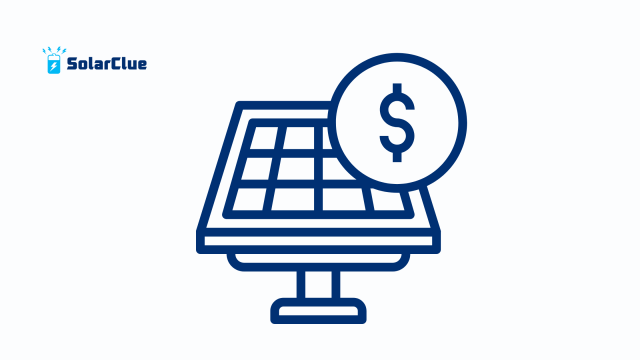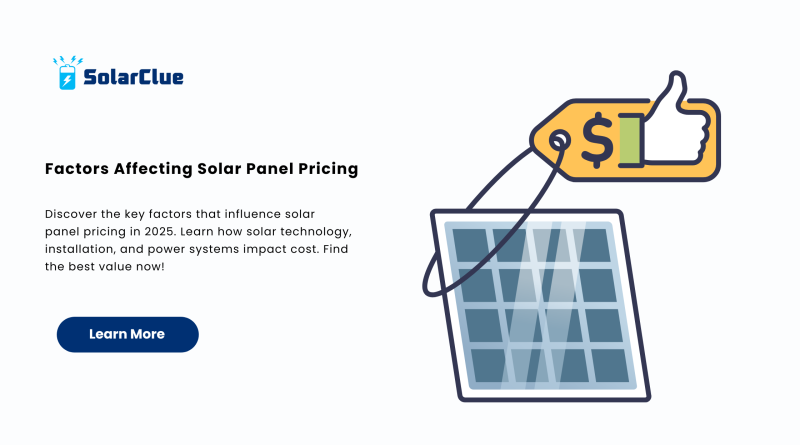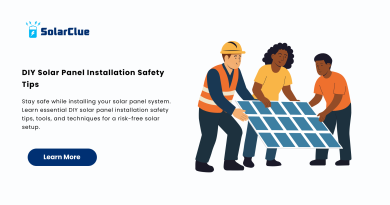Factors Affecting Solar Panel Pricing
Switching to solar energy is a smart investment, both environmentally and financially. Yet, understanding the factors affecting solar panel pricing is essential before making a purchase. With advancements in solar technology and growing demand for the best solar panel, prices can vary significantly depending on a variety of elements. In this blog, we break down every factor that contributes to the solar panel price, so you can make an informed decision.
Table of Contents
- 1 1. Type and Quality of Solar Panels
- 2 2. Efficiency and Wattage Output
- 3 3. Brand and Manufacturer Reputation
- 4 4. Solar Technology Advancements
- 5 5. Installation Costs
- 6 6. Geographic Location and Sunlight Availability
- 7 7. Inverter Type and Battery Storage
- 8 8. Government Incentives and Subsidies
- 9 9. Solar Panel Size and System Design
- 10 10. Mounting Structure and Accessories
- 11 11. Warranty and Maintenance Services
- 12 12. Supply Chain and Global Market Trends
- 13 13. Bulk Purchase or Community Solar Options
- 14 14. Financing and Payment Options
- 15 15. Certification and Compliance Standards
- 16 Conclusion
1. Type and Quality of Solar Panels
Monocrystalline vs. Polycrystalline Panels
Monocrystalline panels are known for their higher efficiency and sleek appearance. However, they usually come at a higher cost than polycrystalline panels due to their complex manufacturing process.
Thin-Film Solar Panels
Though less efficient, thin-film panels are flexible and easier to install, making them a cost-effective option for large or irregular surfaces.
2. Efficiency and Wattage Output
Higher-efficiency panels produce more power per square meter. This can save you money in the long run but might result in a higher upfront solar panel pricing.
3. Brand and Manufacturer Reputation
Top brands typically charge more due to their proven track records, extensive warranties, and better customer support. Choosing the best solar panel might mean paying a premium for long-term reliability.
4. Solar Technology Advancements
Newer solar technology like bifacial panels or PERC (Passivated Emitter and Rear Contact) improves efficiency and durability but often costs more initially.
5. Installation Costs
Labor costs, roof complexity, and local regulations can greatly influence the total price of your solar power system. Professional installation ensures optimal performance, which justifies the cost.
6. Geographic Location and Sunlight Availability
Regions with high solar irradiance will need fewer panels to meet energy needs, potentially reducing total installation costs.
7. Inverter Type and Battery Storage
The kind of inverter (string, micro, or hybrid) and the inclusion of energy storage (like lithium-ion batteries) can increase your investment but boost efficiency and reliability of your solar power setup.
8. Government Incentives and Subsidies
In India, government subsidies on solar power systems can significantly cut costs. State-specific incentives can also influence overall pricing.
9. Solar Panel Size and System Design
A larger system with more panels naturally costs more. However, a well-designed system tailored to your energy needs can provide better ROI over time.
10. Mounting Structure and Accessories
Roof-mounted systems might cost less than ground-mounted ones. The choice of racking, wiring, and safety systems can also affect the solar panel pricing.
11. Warranty and Maintenance Services
Longer warranties typically indicate higher product quality and reliability. Including maintenance plans can raise upfront costs but lower long-term expenses.
12. Supply Chain and Global Market Trends
Global demand, raw material costs, and transportation logistics all impact solar panel price. Market trends, such as tariffs or shipping delays, can cause price fluctuations.
13. Bulk Purchase or Community Solar Options

Buying in bulk or joining a community solar initiative can reduce per-panel costs through economies of scale.
14. Financing and Payment Options
Leasing, loans, or outright purchases will influence your overall cost structure. Many providers offer zero-down financing to make solar power more accessible.
15. Certification and Compliance Standards
Panels certified by IEC or BIS assure quality and safety. Certified products may be slightly more expensive but are a wise long-term investment.
Conclusion
Understanding the many variables that affect solar panel pricing helps homeowners and businesses make smarter investment choices. From solar technology and system design to brand reputation and government subsidies, each factor plays a role in determining the final solar panel price. With solar adoption growing rapidly, staying informed ensures you get the best value for your money.
To explore more insightful resources on solar power, visit our expert blogs at blog.solarclue.com or check out the latest products and deals on solarclue.com. Your journey to smarter solar savings starts today!
FAQs
1. What is the average solar panel price in India in 2025?
The average solar panel price ranges from ₹25 to ₹35 per watt, depending on panel type and efficiency.
2. Are monocrystalline panels worth the extra cost?
Yes, if you want higher efficiency and better aesthetics, though they come with a higher solar panel pricing.
3. How do government subsidies affect solar panel pricing?
Subsidies can reduce costs by up to 40%, especially for residential installations under the national solar rooftop scheme.
4. Does higher wattage mean a better solar panel?
Higher wattage generally means more power output, which can be cost-effective in the long term depending on your usage.
5. How can I get the best solar panel for my needs?
Compare panel types, check certifications, read reviews, and consult experts on solarclue.com to make the right choice.




